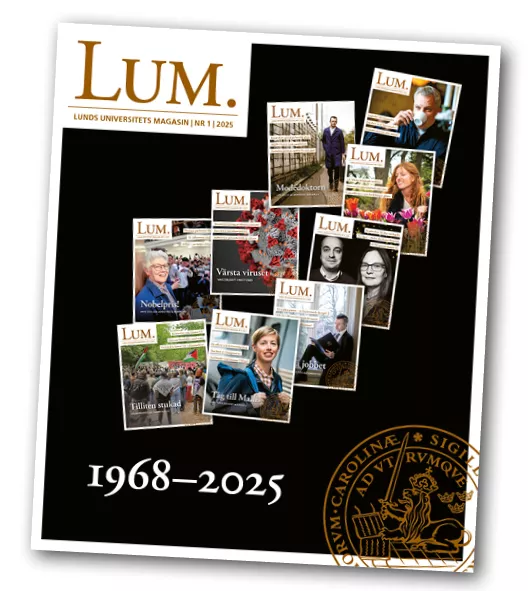The reports from the transverse panels were completed by the start of the new year. There are five such panels divided into recruitment, leadership and organisation, infrastructure, major and interdisciplinary research environments, and external engagement. Within all areas, more or less, there was a demand for structure, clarity and a cohesive approach and responsibility.
Recruitment. "In recruitment, we need to advertise more broadly and see the world as larger than our own environment", says Freddy Ståhlberg, who believes in a more concerted policy for the whole University on this.
He does not agree with the concept of "in-breeding" which appears somewhere in the panel report, but he thinks more effective international recruitment, which also entails taking better care of the international researchers and their families, would be desirable.
"We have plenty more to do in that respect!"
The Faculty of Law and the Wallenberg Centre at the Faculty of Medicine are highlighted as good examples of how to work deliberately with international recruitment.
Leadership and organisation
With regard to leadership, governance and organisation, the panel participants encountered a bold and positive spirit, often easy-going with the attitude that "it will all work out”. But in many areas, leadership is unstructured and a lot ends up ad hoc in the lap of the head of department. Mats Benner, the other RQ20 project manager, interprets the panel report as a call for the University leadership to be braver and step up more clearly.
"It is not incompatible with collegial leadership to dare to set targets and articulate them. To have ambitions and goals does not per se mean that you must be the type of leader who is heavy-handed", he says.
Infrastructure
The University's infrastructure is highly praised. Not least at the intermediate level, there are many fine laboratories, equipment and facilities. However, the panel wonders, how is this to be used and by whom? A better description is required as well as a systematisation. For example, how many cell sorters are there at the Faculty of Medicine? The Humanities laboratory is highlighted as an example to follow of good infrastructure which also functions universally – for and with other faculties.
Interdisciplinarity. With regard to interdisciplinarity, the University is successful in coordinating itself into strong interdisciplinary groups and environments, such as the Linnaeus environments and the strategic research areas, or SRAs. But the panel participants are surprised that these flagships are not better highlighted and utilised in other contexts.
"They were considered as underutilised, largely lacking links to education, living their own lives and not feeding into the University as they potentially could", says Mats Benner.
External engagement
According to Freddy Ståhlberg, the panel participants working on external engagement had the most difficult task.
"External engagement is pretty much everywhere, but the picture is fragmented."
However, the University was praised for having its own organisation, the External Engagement Council, established and led by the former pro vice-chancellor Bo Ahrén. Yet a systematic approach is lacking to answer questions about what partners are for and what the University wishes to achieve with them.
Mats Benner adds that it is important not only to look at oneself and one's own research team, but to think about what is good external engagement for the whole University.
"The panel also met with Region Skåne which is facing several major societal challenges such as an ageing population and the current pandemic. Here, the panel encourages LU to increase its engagement", say the project managers.
The RQ20 research evaluation is complete
As the transverse panels have now also submitted their reports, the whole of the major RQ20 research evaluation with 32 subject panels and 161 evaluation units – is complete!
"But the idea is not that it should be complete; rather the remit was quite vague at the outset and we have tried to keep it that way throughout – more of a dialogue that we would like to pursue", say the project managers.
Malin Bredenberg, who is the project coordinator, explains that the instructions for the evaluation were designed to allow adaptation to individual organisations, which was appreciated.
"And the external panel participants were keen to ensure that the report would not simply gather dust on a shelf, but rather considered themselves a part of our change work", she says.
The interest is enormous
Freddy Ståhlberg says that what was hoped for as a result of the report has already happened.
"The interest is enormous. The new University management almost tore the report out of our hands."
A comparable evaluation, entitled RQ08 was conducted twelve years ago.
"It was important at the time. It dealt with Lund University's position in the world, whereas RQ20 is about how we can defend and develop our position", says Mats Benner.
He thinks that the best way for the University to develop is to take many small steps.
"No great leaps, but with an ambition to be a welcoming and honest higher education institution which is continuously rising and improving."
Now the extensive research evaluation will be printed and presented in a wider context at a seminar for all those interested, at the end of March.





